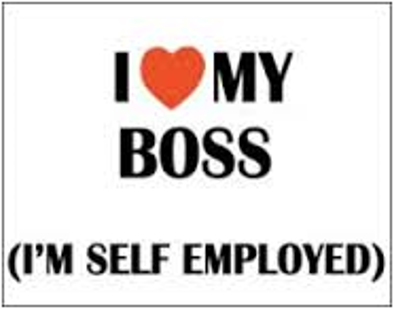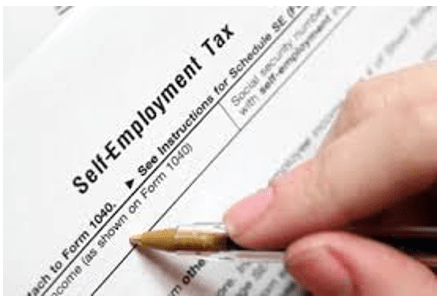Introduction: How to Register as Self Employed for Tax Purposes
There is nothing worse than having a boss who is continually breathing down your neck. Even if you enjoy the work you are doing, an unfair and authoritarian boss can make any job unbearable.
In today’s job market, however, there are a number of self employment opportunities out there.
Learning how to be self employed can offer you better hours and the ability to work from home so that you can spend more time with your family. However, learning how to be self employed also requires that you find out how to register as self employed to pay the self employment tax rate.
In this brief article, AdvisoryHQ will offer a complete guide on how to register as self employed in order to stay on top of your taxes. We will begin by looking at the best self employment opportunities available before explaining what the self employment tax and the self employment tax rate are.



How to Register As Self Employed
We then go on to explain why you need to register as self employed as well as the steps you need to follow to register for self employment and pay the self employment tax.
We will also let you know where you can find the self employment tax form. Finally, we look at one of the best self employment tax calculators that can help you with your self employment tax rate.
See Also: Best Self-Employed Business Ideas
The Best Self Employment Opportunities Out There
Past generations were pretty much forced into accepting whatever job offer came across their table. Unless you inherited a sizeable sum of money, being an entrepreneur wasn’t a surefire success. In today’s world, however, the rise of the internet has created hundreds of self employment opportunities.
For example, let’s say that you are interested in making a living in the lodging and hotel industry. Twenty years ago you, even if you had studied up on how to be self employed, buying a hotel and competing against some of the biggest corporate giants would have been a risky financial investment, to say the least.
Today, however, there are numerous opportunities to open your own small hotel or bed and breakfast out of your own home. Websites likes Airbnb allow you to advertise your “hotel,” and thousands of people prefer the comfort and unique feel of family-run bed and breakfasts over chain hotels.
Similarly, companies like Uber and Lyft constitute other self employment opportunities for people who want to make a living as taxi drivers. Instead of having to share your profits with a boss who sits behind a desk, the apps for companies like Uber and Lyft allow you to find your clients and keep more profit for yourself.
Learning how to be self employed in today’s society requires knowledge about how to use and take advantage of the internet. Freelancers of any type can offer their service to clients online and should be able to find plenty of self employment opportunities to make a decent living.
Don’t Miss: Becoming Self-Employed | Guide
What Is the Self Employment Tax and the Self Employment Tax Rate?
One of the benefits of working for a boss is that your taxes are generally pretty easy. Once you get your W-2 forms in the mail, you can usually get away with filing a simple 1040 EZ form and be done within an hour or two. Learning how to register as self employed and pay the self employment tax, however, takes a little bit more time.



Self Employment Tax Rate
People who work for themselves in the United States have two different self employment tax obligations when they learn how to register as self employed. When you register as self employed, there is no company withholding your Medicare and Social Security benefits from your paycheck.
To register for self employment, then, requires that you file a self employment tax form to pay for your own Medicare and Social Security benefits. We will cover each self employment tax form in more detail below.
Additionally, when you register for self employment, you also must file income taxes. In order to learn how to register as self employed, you will need to figure the net profit or net loss from your business.
This can be simply done by subtracting your business expenses from the earnings you made through self employment opportunities. The difference is your net profit, which will be used for your self employment tax rate.
All-in-One Change Management Tools
Top Rated Toolkit for Change Managers.
Get Your Change Management Tool Today...
The self employment tax rate is affected by many different things. When you are learning how to register as self employed, there are a number of different deductions that you might be able to take advantage of.
For example, if you work from your home, you might be eligible for a home office deduction. Similarly, if you rent an office space for your own business, you might also be able to get a deduction. You can find out more about this deduction on the Internal Revenue Service webpage here.
The specific self employment tax rate will depend on a number of conditions regarding your business and how much money you make. As with most other taxes, the more profitable your self employment business, the higher your self employment tax rate will be.



How to Pay Self Employment Tax
The IRS website says this about the current self employment tax rate:
“The 2010 Tax Relief Act reduced the self-employment tax by 2% for self-employment income earned in calendar year 2011. The self-employment tax rate for self-employment income earned in calendar year 2011 was 13.3% (10.4% for Social Security and 2.9% for Medicare).
The Temporary Payroll Tax Cut Continuation Act of 2011 extended the self-employment tax reduction of 2% for calendar year 2012 so the rates for 2011 remained in effect for 2012. For self-employment income earned in 2013 and 2014, the self-employment tax rate is 15.3%.
The rate consists of two parts: 12.4% for social security (old-age, survivors, and disability insurance) and 2.9% for Medicare (hospital insurance).”
Related: Why do Businesses Need Key Person Insurance?
Why Do You Need to Register as Self Employed?
If you work at home and never learn how to register as self employed, chances are that you could run into some troubles down the road, both with the IRS and with your own future retirement.
Since self employed individuals don’t have a company that is automatically withholding their Medicare and Social Security benefits, if you don’t register for self employment and file your taxes, you might find your retirement years to be financially stressful. One of the most important aspects of learning how to be self employed, then, is preparing for your later years in life.
Learning how to register as self employed and fulfill your self employment tax obligations is a necessary step for your own financial wellbeing.



Also, if you don’t register as self employed, you might be losing out on government tax returns. Since there are so many different deductions for self employed individuals, you might actually receive a refund from your self employment tax.
Lastly, learning how to be self employed also carries with it the weight of faithfully fulfilling your tax obligations. While some people who register for self employment might feel like they can cheat the system, you might very well be setting yourself up for stiff fines and even prosecution for tax fraud.
According to Smallbusiness.com:
“If you are audited by the IRS and it discovers the underreported income, you may be subject to tax penalties or prosecution. The penalties start at 25 percent if the IRS believes an honest mistake was made to 75 percent if it believes you were fraudulent on your return. If the IRS decides to prosecute you for tax fraud, you could face stiff fines and jail. Attempting to evade tax carries a penalty of up to $250,000 for individuals and up to five years in prison.”
Popular Article: Types of Business Loans for Your Business
How to Register for Self Employment, Pay the Self Employment Tax, and Know Which Self Employment Tax Form to Use
Since there is such a wide variety of self employment opportunities out there, each and every person who is self employed might have a different self employment tax rate. For people who have figured out how to be self employed successfully, however, there are a few common steps you should take.
Below, you will find information on how to register as self employed and which self employment tax form you will need to use.
In order to learn how to register as self employed, you will need to first have a Social Security Number or an Individual Taxpayer Identification Number (ITIN). Once you have those documents, self employed individuals might have to file estimated taxes quarterly.
These quarterly taxes will be for your Medicare and Social Security benefits.To know whether or not your specific self employment endeavor requires you to file estimated taxes quarterly, you can refer to Publication 505 of the IRS. Additionally, this IRS webpage explains who needs to pay estimated taxes and who doesn’t.
If you register for self employment and are required to file quarterly estimated taxes, you will need to fill out the self employment tax form 1040 ES. The instructions for how to fill out this form can be found here and the 1040 ES self employment tax form is also attached to that same document.









To file your annual return for your income tax, there are other self employment tax forms that must be used. We will go through those below.
- Schedule C or Schedule C-EZ: This self employment tax form (the EZ format is a simplified version) is how you report your income or loss from a business you operated or a profession you practiced as a sole proprietor. An instructional booklet on how to fill out this form can be found here.
- Schedule SE (Form 1040): This is the form you will use to report your Social Security or Medicare taxes. You should first fill out the Schedule C form because your net profit or loss from your self employment business will determine how much you will have to pay, if anything. An instructional booklet for this self employment tax form can be found here.
The Best Self Employed Tax Calculator to Help You with Your Self Employment Tax Rate
Learning how to be self employed might sound like a great idea on paper, but many people might find the burden of learning how to register as self employed too frustrating to deal with. Luckily, you can find a self employment tax calculator online that can help you with your self employment tax.
- The Bankrate self employment tax calculator can be used to help you register as self employed and fulfill your tax obligations. This calculator asks you for your net business income or loss, your net farm income or loss, your church employee income, and your employer paid income and will easily calculate your estimated self employment tax.
- CalcXML also offers an easy-to-use self employment tax calculator. With this calculator, you simply need to input annual self employment income, your annual employer income (if you have any), and your tax filing status. This calculator will then calculate your estimated self employment tax.
Read More: Business Startup Costs (What Is a Startup?)
Free Wealth & Finance Software - Get Yours Now ►
Conclusion – How to Register as Self Employed to Stay on Top of Your Taxes
Learning how to be self employed offers tremendous benefits. You can determine your own hours, be your own boss, and rest assured in the knowledge that you will directly benefit from the extra energy and dedication you put into making your business venture successful.
In this article, we have shared with you all the information you need to know to register for self employment and stay on top of your taxes. The self employment tax forms that you need have also been covered. Staying on top of your taxes as a self employed individual will save you headaches in the future and will make your self employment more enjoyable and stress free.
Image Sources:
- https://www.pexels.com/photo/wall-picture-photo-portrait-18178/
- https://www.psychologytoday.com/intl/blog/how-do-life/201406/are-you-cut-out-self-employment
- https://www.wilsonrogers.net/blog/2014/07/29/tax-issues-for-self-employed-individuals/
AdvisoryHQ (AHQ) Disclaimer:
Reasonable efforts have been made by AdvisoryHQ to present accurate information, however all info is presented without warranty. Review AdvisoryHQ’s Terms for details. Also review each firm’s site for the most updated data, rates and info.
Note: Firms and products, including the one(s) reviewed above, may be AdvisoryHQ's affiliates. Click to view AdvisoryHQ's advertiser disclosures.



